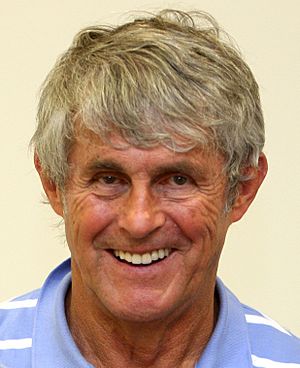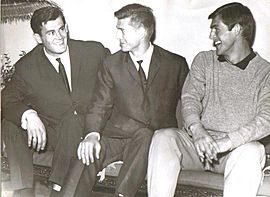Bora Milutinović facts for kids

Milutinovic in 2012
|
||||||||||||||||||||||||||||||||||||||||
| Personal information | ||||||||||||||||||||||||||||||||||||||||
|---|---|---|---|---|---|---|---|---|---|---|---|---|---|---|---|---|---|---|---|---|---|---|---|---|---|---|---|---|---|---|---|---|---|---|---|---|---|---|---|---|
| Full name | Velibor Milutinović | |||||||||||||||||||||||||||||||||||||||
| Date of birth | 7 September 1944 | |||||||||||||||||||||||||||||||||||||||
| Place of birth | Bajina Bašta, Yugoslavia | |||||||||||||||||||||||||||||||||||||||
| Height | 1.77 m (5 ft 9+1⁄2 in) | |||||||||||||||||||||||||||||||||||||||
| Position(s) | Midfielder | |||||||||||||||||||||||||||||||||||||||
| Youth career | ||||||||||||||||||||||||||||||||||||||||
| 1954–1958 | Bor | |||||||||||||||||||||||||||||||||||||||
| Senior career* | ||||||||||||||||||||||||||||||||||||||||
| Years | Team | Apps | (Gls) | |||||||||||||||||||||||||||||||||||||
| 1958–1960 | OFK Beograd | 15 | (2) | |||||||||||||||||||||||||||||||||||||
| 1960–1966 | Partizan | 40 | (3) | |||||||||||||||||||||||||||||||||||||
| 1965–1966 | → OFK Beograd (loan) | 12 | (3) | |||||||||||||||||||||||||||||||||||||
| 1966–1967 | Winterthur | 20 | (1) | |||||||||||||||||||||||||||||||||||||
| 1967–1969 | Monaco | 42 | (3) | |||||||||||||||||||||||||||||||||||||
| 1969–1971 | Nice | 37 | (0) | |||||||||||||||||||||||||||||||||||||
| 1971–1972 | Rouen | 11 | (0) | |||||||||||||||||||||||||||||||||||||
| 1972–1976 | UNAM | 93 | (12) | |||||||||||||||||||||||||||||||||||||
| Total | 270 | (24) | ||||||||||||||||||||||||||||||||||||||
| Managerial career | ||||||||||||||||||||||||||||||||||||||||
| 1977–1983 | UNAM | |||||||||||||||||||||||||||||||||||||||
| 1983–1986 | Mexico | |||||||||||||||||||||||||||||||||||||||
| 1987 | San Lorenzo | |||||||||||||||||||||||||||||||||||||||
| 1987 | Udinese | |||||||||||||||||||||||||||||||||||||||
| 1988 | Veracruz | |||||||||||||||||||||||||||||||||||||||
| 1988–1989 | Tecos UAG | |||||||||||||||||||||||||||||||||||||||
| 1990 | Costa Rica | |||||||||||||||||||||||||||||||||||||||
| 1991–1995 | United States | |||||||||||||||||||||||||||||||||||||||
| 1995–1997 | Mexico | |||||||||||||||||||||||||||||||||||||||
| 1997–1998 | Nigeria | |||||||||||||||||||||||||||||||||||||||
| 1998–1999 | MetroStars | |||||||||||||||||||||||||||||||||||||||
| 2000–2002 | China | |||||||||||||||||||||||||||||||||||||||
| 2003–2004 | Honduras | |||||||||||||||||||||||||||||||||||||||
| 2004–2005 | Al Sadd | |||||||||||||||||||||||||||||||||||||||
| 2006–2007 | Jamaica | |||||||||||||||||||||||||||||||||||||||
| 2009 | Iraq | |||||||||||||||||||||||||||||||||||||||
| 2014 | China (advisor) | |||||||||||||||||||||||||||||||||||||||
|
Medal record
|
||||||||||||||||||||||||||||||||||||||||
| *Club domestic league appearances and goals | ||||||||||||||||||||||||||||||||||||||||
Velibor "Bora" Milutinović (born 7 September 1944) is a Serbian former professional footballer and manager. He is famous for coaching five different national teams in five straight FIFA World Cup tournaments. These teams were Mexico (in 1986), Costa Rica (in 1990), the United States (in 1994), Nigeria (in 1998), and China (in 2002).
Bora Milutinović is also the first coach to lead four of these teams past the first round of the World Cup. Because of his amazing success, especially with teams that weren't expected to do well, he earned the nickname Miracle Worker. He has coached a total of eight national football teams in his career.
Contents
Bora Milutinović's Coaching Journey
Bora Milutinović had a long and interesting career as a football coach. He is best known for his work with national teams, especially in the World Cup.
Coaching in the World Cup
Milutinović's unique ability to guide different teams to World Cup success made him a legend.
Mexico's 1986 World Cup Run
Bora Milutinović coached the Mexican team when they hosted the 1986 FIFA World Cup. He led them to the quarter-finals, which was their best World Cup finish ever. Mexico was eventually knocked out by West Germany after a penalty shootout.
Costa Rica's Surprise in 1990
Just before the 1990 FIFA World Cup, Milutinović took over the Costa Rican team. He made some big changes, even replacing the team captain. Despite the short time, he helped Costa Rica reach the second round. They won against Scotland and Sweden, and only lost 1–0 to Brazil. They were defeated by Czechoslovakia in the second round.
United States' Home World Cup in 1994
The U.S. national team hired Milutinović in 1991. American coaches hadn't had much success on the international stage. The U.S. Soccer Federation wanted a coach who could get the most out of their team. Milutinović was known for surprising World Cup results.
He was a strict coach and made it clear he was in charge. He even told player Alexi Lalas to get a haircut or leave the team! Milutinović coached the U.S. team in the 1994 FIFA World Cup, which was held in the United States. The team won a World Cup match for the first time since 1950. They also made it to the knockout round for the first time since the 1930s. This was seen as a huge success for a country that was still developing its soccer program.
Nigeria's Performance in 1998
Milutinović then coached the Nigerian team at the 1998 FIFA World Cup in France. Nigeria won their group, including an exciting 3–2 win over Spain. They reached the knockout rounds, making it the fourth team Milutinović had led past the first round. This set a new coaching record.
China's Historic Qualification in 2002
Under Milutinović's coaching, the Chinese national team qualified for the World Cup for the very first time in 2002. He became a hero in China, ending a 44-year wait for World Cup qualification. He was often called Milu by fans. However, the Chinese team, being new to the world stage, could not get past the first round.
Other National Teams Milutinović Coached
Bora Milutinović also coached several other national teams.
Honduras (2003–2004)
In 2003, Milutinović was close to coaching his home country, Serbia. But he decided to coach the Honduras national team instead. He led them through the first round of CONCACAF qualifiers. He resigned in June 2004, saying there was a "bad atmosphere" created by comments from officials and the press.
Jamaica (2006–2007)
In November 2006, Milutinović became the head coach of Jamaica. However, after a series of friendly match losses, he was fired by the Jamaican Football Association in November 2007.
Iraq (2009)
Milutinović coached the Iraq national football team in the 2009 FIFA Confederations Cup. His team had two draws and one loss in the group stage, and did not advance to the knockout stage.
Club Team Coaching
Milutinović also coached several club teams, though with mixed results compared to his national team success.
His longest time coaching a single club was with UNAM in Mexico from 1977 to 1983. Many of his players from UNAM later played for the Mexican national team in the 1986 World Cup. He also had short coaching periods with teams like Udinese in Italy and MetroStars in the Major League Soccer in the U.S.
Coaching Records
Here is a summary of Bora Milutinović's coaching statistics for various teams:
| Year(s) | Nat | Team | G | W | D | L | Win % | GF | GA | Ref(s) |
|---|---|---|---|---|---|---|---|---|---|---|
| 1977–1983 | UNAM | 218 | 96 | 59 | 63 | 44 | 406 | 299 | ||
| 1983-1986, 1995-1997 | Mexico | 104 | 52 | 32 | 20 | 50 | 172 | 101 | ||
| 1987 | San Lorenzo | 8 | 4 | 4 | 0 | 50.0 | 8 | 2 | ||
| 1987 | Udinese | 9 | 3 | 0 | 6 | 33.3 | 6 | 10 | ||
| 1988 | Veracruz | |||||||||
| 1988–1989 | Tecos UAG | |||||||||
| 1990–1991 | Costa Rica | 9 | 3 | 0 | 6 | 33.3 | 7 | 13 | ||
| 1991–1995 | United States | 96 | 30 | 31 | 35 | 31.3 | 116 | 110 | ||
| 1997–1998 | Nigeria | 11 | 3 | 2 | 6 | 27.3 | 10 | 22 | ||
| 1998–1999 | NY/NJ MetroStars | 33 | 5 | 3 | 25 | 15.2 | ||||
| 2000–2002 | China | 46 | 20 | 11 | 15 | 43.5 | 75 | 50 | ||
| 2003–2004 | Honduras | 10 | 2 | 4 | 4 | 20.0 | 12 | 14 | ||
| 2004–2005 | Al-Sadd | |||||||||
| 2006–2007 | Jamaica | 6 | 1 | 1 | 4 | 16.7 | 5 | 15 | ||
| 2009 | Iraq | 4 | 0 | 3 | 1 | 0.0 | 1 | 2 |
Bora Milutinović's Personal Life
Bora Milutinović comes from a family of footballers. His two brothers, Miloš and Milorad, also played football. They even played together for the club Partizan.
Bora had a tough childhood. He lost both his parents when he was very young. His father died during World War II, and his mother passed away from tuberculosis soon after the war. He was raised by his aunt and grew up playing football.
Today, Milutinović is married to a Mexican woman and lives in Qatar. Besides his native language, Serbo-Croatian, he can speak English, Spanish, Italian, and French.
Awards and Achievements
Bora Milutinović has won several awards and titles both as a player and as a manager.
As a Player
UNAM
- Copa MX: 1974–75
- Campeón de Campeones: 1975
As a Manager
UNAM
- Liga MX: 1980–81
- CONCACAF Champions' Cup: 1980, 1982
- Copa Interamericana: 1981
United States
Mexico
- Gold Cup: 1996
See also
 In Spanish: Bora Milutinović para niños
In Spanish: Bora Milutinović para niños
 | James Van Der Zee |
 | Alma Thomas |
 | Ellis Wilson |
 | Margaret Taylor-Burroughs |


